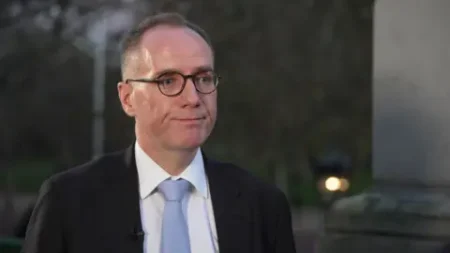**Title: Expanding Online Safety Measures for Children: A Commitment from the Government**
In response to the growing concerns regarding children’s safety online, the UK government is intensifying its focus on implementing new regulations designed to bolster safety measures on the internet. Cabinet Minister and Transport Secretary Heidi Alexander has emphasized the urgency of these actions, stating that the government will not remain passive in addressing the risks children face in the digital realm.
The upcoming implementation of new age-verification rules, set to commence later this month, has been labeled by Alexander as “really important.” This initiative, overseen by the media regulator Ofcom, marks a significant step in the journey toward creating a safer online environment for children. Alexander further indicated that these regulations should not be viewed as the concluding measures in the broader discourse on online safety, suggesting that more elaborate strategies are in store.
Melanie Dawes, the chief executive of Ofcom, has pledged to effectively enforce the new requirements, stressing that the regulator is serious about its role in ensuring compliance with the rules. However, she also acknowledged that there might be a need for additional legal powers in order to tackle the rapidly evolving challenges posed by technological advancements, especially in the realm of artificial intelligence (AI).
The legislation anchored in the Online Safety Act, which was enacted under the previous Conservative government, empowers Ofcom to oversee internet companies in their efforts to verify the ages of users more rigorously, specifically targeting those under the age of 18. The new framework, which will take effect from July 25, will also introduce changes to algorithms that influence children’s feeds, ensuring that harmful content is filtered out and does not reach vulnerable audiences.
The Labour Party, during the last election, dedicated itself to enhancing existing regulations and considering further initiatives aimed at securing children’s safety in online spaces. However, critics note that the government has yet to unveil any fresh legislative proposals. Current priorities appear to focus on successfully rolling out existing regulations before moving forward.
Ian Russell, a prominent advocate for online safety and father of Molly Russell—who tragically took her own life at the age of 14 after being exposed to harmful online content—has remarked on the significance of the new rules, describing them as potentially the “biggest moment in online safety” since the inception of social media. He has expressed his hope for accountability and stronger action from Ofcom, suggesting that effective enforcement will be the true test of the legislation’s impact.
In terms of future initiatives, Secretary Alexander identified the government’s awareness of “addictive habits” that children may develop through their interaction with technology. The government is reportedly considering measures to mitigate these behaviors, with propositions such as placing a two-hour limit on the usage of specific social media applications and implementing a curfew of 10 p.m. for usage.
Alongside these measures, there is a growing call for a ban on smartphones in schools. The education secretary is currently examining the guidance that empowers individual headteachers to implement such bans. Nevertheless, the government has refrained from introducing a nationwide ban, casting aside a recent Conservative proposal to do so.
Alexander indicated the necessity of striking a balance on this issue, recognizing that many parents appreciate the security of having their children carry phones on their way to school. Shadow Minister Chris Philp, reflecting on the past Conservative government’s term, lamented its failure to legislate a fundamental ban on smartphones in educational institutions.
Ofcom’s chief executive has reiterated that the new regulations will mandate substantial alterations to content algorithms used by tech platforms. While offering flexibility in choosing age-verification methods, Dawes has assured that platforms failing to adhere to the new standards will be met with enforcement actions. However, she acknowledged the limitations of the current legislation concerning newer AI developments, suggesting potential future adjustments may be necessary to effectively address these advancements.
In summary, the dynamic landscape of online safety for children in the UK is set for a transformative phase, underscored by regulatory changes and a renewed commitment from the government to protect young users from harm. The conversation surrounding internet safety is gaining momentum, with stakeholders advocating for stringent measures and collaborative efforts to create a safer cyberspace for all.










